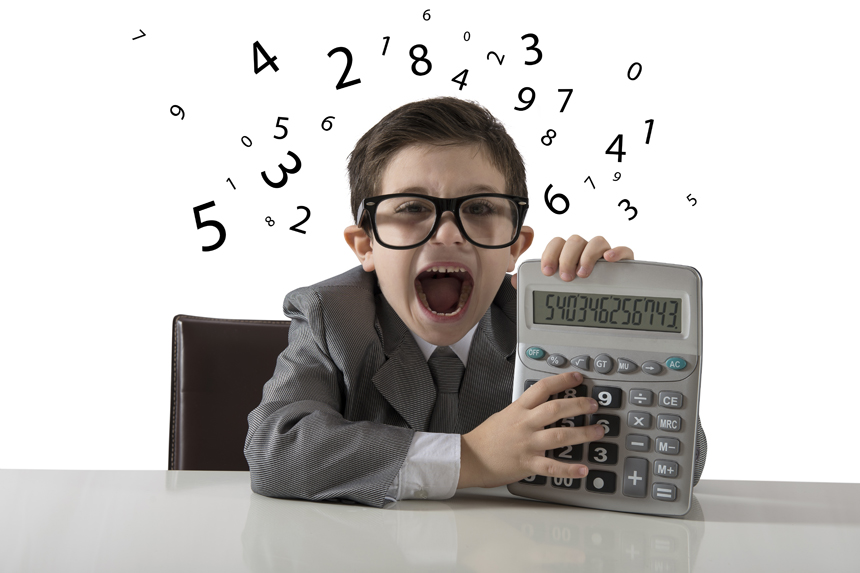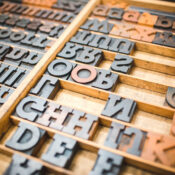Senior managing editor and logophile Andy Hollandbeck reveals the sometimes surprising roots of common English words and phrases. Remember: Etymology tells us where a word comes from, but not what it means today.
For the most part, the names of our numbers follow a nice, predictable pattern. That’s true in other languages as well: You’ll find a base set of number names — usually 10, but sometimes 12 or 20 — and then a system that builds off this base to create ever higher numbers.
In English, the “base” numbers are, of course, zero through ten. Etymologically, there isn’t much to break down here — though their spelling and pronunciation has changed over the centuries, these names have always represented the numbers they do now.
The majority of the next set of ten numbers use an ending that is an inflected form of the word ten, namely -teen, or in Old English, –tene. This form simply means “ten more than,” so fourteen, for example, means “ten more than four,” which, for the mathematically disinclined, is exactly what 14 is.
After the teens, number names start using the -ty ending. This comes from the Old English –tig, indicating “groups of ten.” Forty-two, then, is “four groups of ten, and two.”
That gets us all the way to ninety-nine except for two numbers that are a little different: eleven and twelve, also known as the tweens if we’re talking about children’s ages. If they followed the same pattern as other numbers, they would be something akin to oneteen and twoteen, but for some reason they don’t. But just like all the other numbers, their names reflect a little etymological mathematics, though in these cases it’s subtraction, not addition. To understand it, we have to start at one.
In many languages today, the word meaning “one” and the word (or a form of it) for the indefinite article are the same. In French, for example, the word is un: un ordinateur can mean both “a computer” and “one computer.” In German, it’s ein, as in ein Computer.
For a long time, Old English got away without indefinite articles at all. People wouldn’t say, “He is a smart writer,” but instead, “He is smart writer.” But with the influence of French after 1066, indefinite articles found their way into English. Like French, English used its word for “one,” which at the time was an. And in some cases, an was altered to end, which is what became the first syllable of eleven.
The second syllable comes from the Old English verb læfan “to leave.” These roots combined to give us the Old English number endlæfan, literally “one left over.” The implied arithmetic is that if you subtract 10 from this number, you’d have a remainder of 1.
Twelve is the same way. Old English twa (“two”) + læfan was shortened a bit more than its predecessor to become twelf. It became twelve in Modern English, but it still traces back to a combination that means “two left over.”
Unlike French and German, the two senses of the Old English an differentiated and then continued to change. The “original” version — which started off meaning “one” — stuck around as the indefinite article. The dropping of the n before words starting with consonants was finished by around the mid-1300s. Meanwhile, the numerical sense of an developed into one, which was originally pronounced more like “own.” But starting in the 14th century, the “wun” pronunciation took root in a dialect in southwestern England and began spreading. This, our modern pronunciation, didn’t become the standard form until the 1700s.
Become a Saturday Evening Post member and enjoy unlimited access. Subscribe now




Comments
Andy,
Thank you for the information about the spelling of FORTY (see posts below). Your explanation is much appreciated! Also, I never even thought about the word FORTNIGHT being a contraction of FOURTEEN NIGHTS.
The English language is certainly quirky, not only in spelling but also in grammar. Although it’s been awhile, I do remember some basics from school:
(1) When writing creatively, you should avoid clichés like the plague (because they’re old hat).
(2) In the English language, double negatives are a no-no!
(3) A preposition is a word you should never end a sentence with.
(4) We were told a billion times to never, ever, ever exaggerate!
Keith,
That is a weird quirk of spelling. The answer lies in the fact that the word “forty” (in one form or another) had existed in English long before there was any attempt to standardize spelling. Words were largely spelled phonetically, and some people (including Shakespeare) spelled the word that way, and that’s where the spelling settled later.
Though “forty” is the only four-based cardinal number without the U, it isn’t the only word of its ilk with that letter absent: “fortnight” — meaning “two weeks” — is a contraction of “fourteen nights,” but also from a time before standardized spelling.
The English spelling of the number 40 is special for a couple reasons. One, it’s believed to be the only whole number that, when spelled out in English, has all its letters appear in alphabetical order, namely : F-O-R-T-Y. I don’t know if it’s true, as I can count up to only one zillion. The other special thing about the spelling of FORTY is that it doesn’t contain the letter “U” . Can anyone please explain to me why this is so? After all, the number FOUR has a U in it, as does FOURTEEN, FOUR HUNDRED, FOUR ZILLION, et al. Even ONE FOURTH and NEGATIVE FOUR contain the U. But not 40. Seems 40 is the only derivative of FOUR that doesn’t have the U. Maybe the reason is so that all the letters in FORTY would be in alphabetical order, since FOURTY doesn’t.
Hear ye, hear ye! Some pretty swell stuff here; combining numbers and Old English. I wish ‘Password’ was still on, in the original version. I’d love to be giving Elizabeth Montgomery the clue words. One of the best players ever. No wonder Allen Ludden had her on so often. Betty White also, of course.
I think both the clue and answer had to be one word. Just wondering though. what if the number were two words? I could say to Elizabeth “car”, she might say “automobile”, I’d say “flight”, she’d say (the answer) “Thunderbird!” OR… I’d get a clue of “car” and say “auto”. Then she’d simply say “fifty-seven” and I’d say (the answer) “Chevy!” By the way, Chevrolet was a regular sponsor of her bewitching show during its 1964-’72 original run.